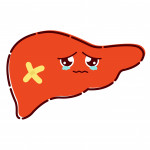Coffee Consumption Helps Non-alcoholic Fatty Liver Disease
Recent studies published by the Journal of Hepatology indicate the benefits of coffee consumption for improving non-alcoholic fatty liver disease. The Rotterdam study found drinking 3 or more cups of coffee is associated with lower liver stiffness (fibrosis) in the general population.
The Mayo Clinic states, “In studies of people with non-alcoholic fatty liver disease, those who reported drinking coffee had less liver damage than those who drank little or no coffee.”
The good news is drinking coffee is shown to help liver disease patients. A healthy step to take control of high blood sugar and reduce processed chemicals needs to be kept in mind when consuming coffee.
Recommendations are to shy away from sugar, sugar substitutes, and processed creamers.
Vitamin E Benefits for Non-alcoholic Fatty Liver Disease
Mayo Clinic states, “In theory, vitamin E and other vitamins called antioxidants, could help protect the liver by reducing the damage caused by inflammation. But more research is needed.
Evidence suggests that vitamin E supplements may be helpful for people with liver damage caused by non-alcoholic fatty liver disease. But a warning is stated that vitamin E has been linked with increased risk of death and, in men, an increased risk of prostate cancer.”
Vitamin E is a fat-soluble vitamin and therefore can be harmful if taken too much. The daily recommendation for Vitamin E for an adult is 60 to 75 units per day on average. Consult with your doctor or pharmacist for the amount that is right for you.
If you take vitamin E for its antioxidant properties, keep in mind that the supplement might not offer the same benefits as naturally occurring antioxidants in food.
Vitamin E can also be found in dietary sources like green leafy vegetables, whole grains, fortified cereals, and vegetable oils, and nuts. You can also get vitamin E from meats, dairy, leafy greens, and fortified cereals. A healthy diet of non processed foods and natural sources is recommended. A healthy diet benefits the body and helps fight many disease conditions.
Be sure to consult with your physician before taking any vitamins or supplements.
Overall studies have found the best help for non-alcoholic fatty liver disease is to lose weight and exercise.
Where are you in your journey with hepatitis C or non-alcoholic fatty liver disease? Are you at risk?
We’d love to hear from you today. Share your comments below.
This entry was originally published on Life Beyond Hepatitis C, August 19, 2020. It is reprinted with permission.








Comments
Comments